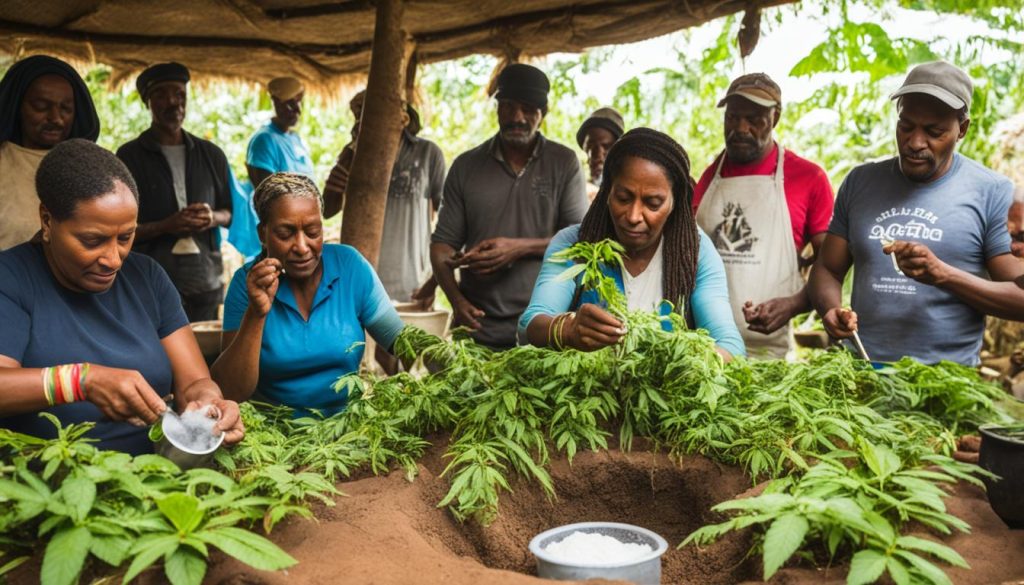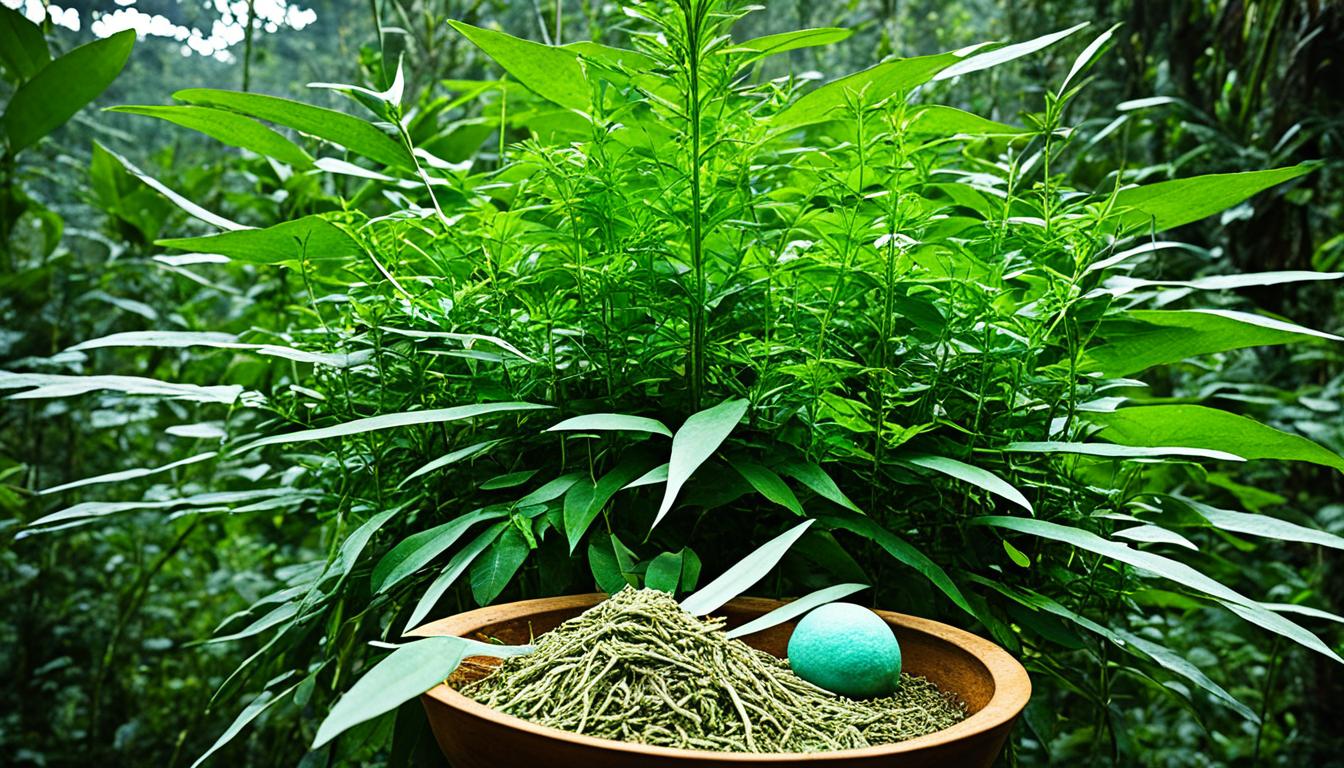The enigmatic iboga plant, a verdant herald of both ancient tradition and innovative healing, offers a tapestry of uses that bridge the gap between ancestral wisdom and cutting-edge health practices. As we delve into the multifaceted world of iboga plant medicine, we uncover its roles in aiding addiction treatment, facilitating mental health improvement, and fostering spiritual growth and personal development. This potent natural remedy, born out of the lush rainforests of Central Africa, serves the needs of modern therapy while honoring its profound cultural heritage in traditional medicine. With a gentle nod to its storied past and a keen eye on its therapeutic potentials, we will explore the myriad iboga benefits that have captivated healers and seekers alike.
Key Takeaways
- Iboga’s deep connection to traditional cultural rituals and its use in contemporary therapeutic settings.
- The promising applications of iboga in modern therapy, from addiction recovery to psychological wellness.
- A look at iboga benefits for mental health, including its potential in depression and anxiety treatment.
- Understanding of iboga’s role in spiritual practices and its impact on personal development journeys.
- The complex interaction of traditional medicine and modern scientific inquiry in the realm of iboga.
- Insights into the ongoing conversation around iboga’s multifaceted uses and the cautious embracing of its potential.
Understanding Iboga and Its Origins
The rich history of Tabernanthe iboga spans centuries of indigenous practices, particularly within the African continent. Central to this has been its traditional uses of iboga in religious ceremonies and spiritual enhancements. Before we delve deeper into its cultural significance, chemical attributes, and international viewpoints, it’s essential to appreciate iboga’s background and longstanding relevance.

Traditional Uses in African Cultures
Iboga’s journey begins in the heart of African spirituality. As an evergreen shrub, Tabernanthe iboga is more than a plant; it’s a gateway to the ancestors for many followers of the Bwiti religion in Gabon. In these indigenous communities, iboga is consumed for profound rites of passage and to foster personal spiritual discovery.
Extraction and Chemical Composition
Diving into its internal makeup, Tabernanthe iboga reveals a complex maze of iboga alkaloids, with ibogaine being the most recognized due to its psychoactive effects. Extracted from the plant’s root bark through meticulous iboga extraction methods, such as Gas Chromatography-Mass Spectrometry (GC-MS/MS), ibogaine’s iboga chemical composition is both intriguing and potent.
Legal Status Across the World
The legality of iboga is as varied as its uses. Across nations, iboga legal status swings between reverence as a cultural mainstay to stringent prohibition under strict international regulations. This dichotomy is fueled by concerns around iboga’s safety profile, prompting many countries to classify iboga and ibogaine as controlled substances, despite their revered position in traditional heritage.
Iboga’s Role in Addiction Treatment
The journey towards addiction recovery is a complex and multifaceted process, often challenging for individuals to face. With the rise of ibogaine therapy, a compound derived from the African iboga plant, there has been a resurgence of interest in naturalistic approaches to substance abuse treatment. While conventional methods primarily focus on rehabilitation and psychological support, ibogaine introduces a unique biochemical intervention aimed at alleviating the physical and psychological burdens of withdrawal.
Ibogaine therapy represents a promising departure from traditional opioid dependency treatments. Proponents of iboga for addiction tout its ability to mitigate the severity of detoxification symptoms, which can be a major barrier to overcoming opioid dependency. The therapeutic potential of iboga is attributed to the way it seemingly interrupts dependency patterns, helping patients find relief from the cycle of addiction.
For many, the potential benefits of iboga in addiction treatment are not just about symptom management; they represent a beacon of hope for a radical transformation in their lives, and a possible end to the struggle with addiction.
It’s critical to note, however, that ibogaine is not a cure-all. The iboga efficacy must be weighed against the need for careful medical supervision due to the risk of adverse events. While the quest for a sustainable solution to addiction continues, the singular properties of iboga have illuminated a new path for many seeking freedom from the shackles of drug dependency. This has solidified its role in the crucial dialogue on pioneering strategies for addiction recovery and the pursuit of holistic wellness.
Mental Health and the Iboga Experience
The quest for mental health improvement has led to increased interest in alternative treatments, among which iboga has gained ground as a notable option. Distinct from its recognized role in substance dependency, the iboga plant is now being investigated for its potential to bolster psychological performance and enhance mood state. This curiosity is spurred on by iboga’s reputed anti-addictive properties and its intriguing effects on mental wellness.
Iboga Therapy for Depression
Within the realm of mental disorders, iboga for depression represents a compelling area of study. Research into ibogaine, its active compound, suggests a subjective effectiveness similar to that of SSRIs, potentially positioning it as a unique ally against depressive states. Users report a distinct uplift in their psychological functioning after sessions, though these accounts are still being assessed for their clinical implications.
Addressing Anxiety with Iboga
In the case of anxiety disorders, the use of iboga treatment for anxiety emerges as a promising frontier. The anxiolytic potential of iboga, alongside its capacity to induce a state of introspection and mental clarity, offers a fresh perspective on the management of chronic anxiety symptoms, revealing a multifaceted approach to achieving equilibrium in mental health practice.
As the therapeutic landscape evolves, iboga continues to fascinate with its complex psychoactive profile, meriting further research to unlock its full potential in the sphere of mental health treatment. While the journey towards mainstream acceptance and medical validation is fraught with challenges, the burgeoning interest in iboga underscores a collective endeavor to explore all avenues for mental health recovery.
The Spiritual Significance of Iboga Plant Medicine
In the realm of traditional medicine, few substances carry the profound cultural and spiritual significance that iboga does. Central to the cultural heritage and shamanic traditions of Central Africa, iboga has been venerated as a powerful agent for spiritual growth and personal development. Far beyond its empirical applications in modern therapy, the plant’s sacramental use in traditional rituals offers a window into the soul and a pathway to spiritual enlightenment.
Shamanic Traditions and Rituals
Iboga’s integral role in shamanic traditions cannot be overstated. For centuries, it has taken center stage in the Bwiti religion, serving as a conduit for transformative experiences and connectivity with ancestral spirits. Participants in these rituals often describe a profound journey of self-discovery, induced by the plant’s unique alkaloids, which are thought to unlock a deeper understanding of one’s existence and place within the universe. The cultural importance of iboga, therefore, extends well beyond its physical terrain, into the collective psyche of those who practice these ancient rituals.
Iboga’s Influence on Personal Development
The pursuit of personal growth with iboga has transcended its traditional African roots and found resonance with individuals worldwide seeking to deepen their spiritual practice. In contemporary retreat settings, iboga initiates a journey marked by introspection, psychological healing, and the quest for deeper truth, distinguishing it from conventional methodologies. As seekers of spiritual significance engage with iboga, they often report life-altering insights and a renewed sense of purpose, emblematic of the plant’s lasting impact on human consciousness and its potential for facilitating a truly transformative experience.
The Spiritual Significance of Iboga Plant Medicine
What are the primary uses of iboga?
Iboga is used traditionally in shamanistic rituals for spiritual growth and as a modern therapy for addiction treatment, mental health improvement, and personal development. The various benefits of iboga plant medicine include its application in traditional medicine and therapeutic practices for a range of issues.
Can you tell me about the traditional uses of iboga in African cultures?
In African cultures, especially within the Bwiti religion in Gabon, iboga is traditionally used for spiritual discovery, healing, and as a vital part of rites of passage.
What is involved in the extraction and chemical composition of iboga?
The extraction of iboga mainly focuses on the root bark, where ibogaine—a psychoactive alkaloid—is derived through processes like Gas Chromatography-Mass Spectrometry (GC-MS/MS). Ibogaine is one of several active alkaloids found in the iboga plant.
What is the legal status of iboga across the world?
The legal status of iboga varies internationally. In some countries, it is classified as a controlled substance, with restrictions due to its psychoactive properties and potential safety concerns.
How does iboga contribute to addiction treatment?
Iboga, through its active compound ibogaine, has been shown to reduce withdrawal symptoms and cravings, particularly in opioid dependency. It may disrupt addiction patterns and support detoxification, though its use must be medically supervised to manage potential risks.
How effective is iboga therapy for depression?
Preliminary studies and anecdotal reports suggest that ibogaine may have antidepressant-like effects. It potentially improves mood and psychological functioning, but more extensive clinical trials are needed to firmly establish its efficacy and safety for treating depression.
Can iboga be used to address anxiety?
There are indications that iboga has therapeutic potential for anxiety. However, its use in this area is experimental and should be approached with caution due to the lack of comprehensive studies verifying its safety and effectiveness.
What is the role of iboga in shamanic traditions and rituals?
Shamanic traditions use iboga as a means of spiritual exploration, connecting with ancestors, and gaining personal insights. Its ceremonial use plays a central role in the spiritual practices of indigenous communities using iboga.
How does iboga influence personal development?
Iboga is believed to facilitate transformative experiences that lead to profound personal growth and self-discovery. Many people seek out iboga for its potential to catalyze change and spiritual enlightenment within a retreat setting or therapeutic context.

Leave a Reply